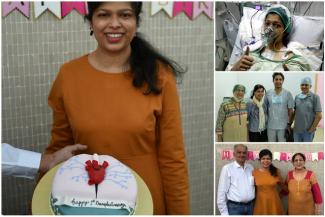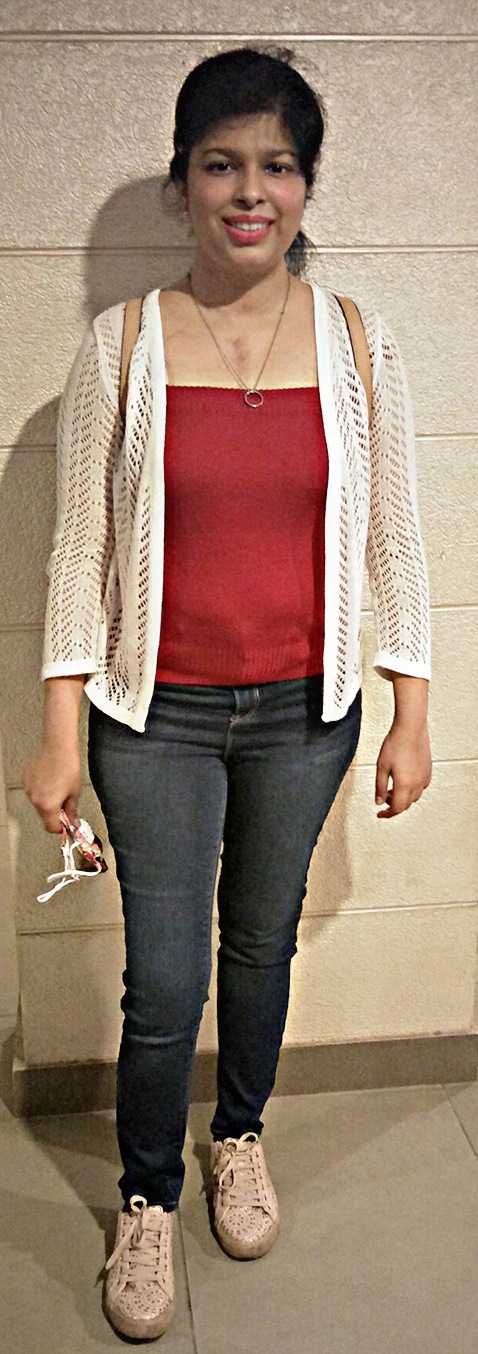
Mili Vakilna, 22 is a hotel management student who underwent a very rare combined heart and double lung transplant at the tender age of 20. She recalls her challenges through school and the pre and post transplant period. Plus what helped her regulate emotions of depression and anxiety.
What were the onset symptoms for your trouble? When was it?
I was born with a hole in my heart, which was corrected with a ventricular septal defect surgery (VSD) when I was 2 years old.
It happens very rarely that after a VSD, a patient is diagnosed with pulmonary hypertension.
I was 8-9 years old when I had a syncopal attack in school, post an aerobics session. That was the time I was diagnosed with pulmonary hypertension, which is a condition in which the blood pressure in the arteries of the heart and/ or lungs increases, which can lead to heart failure. I used to feel breathless after climbing even one flight of stairs.
How did you tackle it?
I was put on oral dosage of medication which controls the blood pressure in the arteries.
Throughout my education, I was advised to use the elevator and was exempted from doing physical/strenuous exercises.
Where did you get your treatment done?
My initial treatment was by a renowned cardiologist who put me on a drug,Sildenafil, to control my pulmonary pressures, after which when my symptoms worsened at the age of 19, I was put under the guidance of a pediatric cardiologist, who is among the very few cardiologists who have the license to prescribe a prostacyclin drug in Mumbai.
How rare is a heart and double lung transplant?
Lung transplant is the last option for severe irreversible diseases such as pulmonary hypertension, cystic fibrosis, interstitial lung diseases, etc. Performing a combined heart and double lung transplant is a very difficult job, and it is not very common even worldwide as all the 3 organs should be from the same person who must be in a favourable condition.
These are the two very vital organs which are required for a person's well being. According to statistical data, there are only a handful of cases of combined heart and double lung transplant.
In my case it was a reopen surgery, one of a kind that my surgeon had performed till 2019. I already had a scar from the VSD and during the transplant, they had to open/cut through the chest again. This is called a reopen surgery.
What were your preparations like?
I looked up the internet and consulted my cardiologist to find out what were the possible treatments for my condition, upon which I found out that a prostacyclin drug (the drug which dilates the arteries to prevent it from narrowing) was a ray of hope for me. The problem was that the drug was not available in India and had to be imported from Singapore. After a few months of taking the drug, my condition did not get any better, which was when we started considering the option of a transplant.
We looked for heart-lung transplant surgeons in India, met a few, but they had done either a lung or a heart transplant. Dr. Attawar in Chennai was shortlisted for my condition. His team performed pre-transplant work-up on me to determine the status of my lungs and heart.
What was once a distant thought had started becoming a reality. I was told that I needed a combined lung and heart transplant.
What was the waiting period like?
I was registered in May 2018, but I felt then that I had time to complete my studies. The situation worsened in September, 2018 when the prostacyclin drug had not been showing effects and edema had increased to such an extent that my pediatric cardiologist told me to rush to Chennai and to stay under the guidance of the transplant team.
Whilst in Chennai, I had 2 "dry runs" for the organs. First time I was prepared for the surgery but it turned out that the organs were not in a favourable condition. The second time was a dry call, after which I was put on mild oxygen support during the night time.
Through the waiting period of 4 months, I was admitted to the hospital twice due to edema.
I underwent a combined heart and double lung transplant at the age of 20.
What kind of precautions did you have to take?
My liquid intake for a day was restricted to 800 ml, which had to be followed very strictly as I had severe edema( water retention) due to my condition.
There were some restrictions on food as well which had to be followed.
I had to do physiotherapy to make my body ready to undergo a transplant.
The very important thing to be kept in mind was that I had to make sure I did not catch any kind of infection because that could delay my transplant.
Did you have to stay in isolation before/after the surgery? For how long?
Pre - transplant there was no isolation required, other than my usual restrictions. I used to only wear a mask whenever I used to go out or if someone visited me.
I was in strict isolation for the first 4 months post transplant. No one was allowed to enter my room without wearing a mask, cap and a full-sized gown. My mother had to clean my room, as the maid was not allowed to enter my room.
The conditions were reduced thereafter, but I had to isolate myself or wear a mask whenever someone came from outside or if my parents were sick.
I followed this for a year very strictly and still follow the rules whenever someone comes from outside.
Did you face any complications post - transplant?
I had an antibody mediated rejection (AMR) after 14 days of my transplant, which means that my body had started rejecting my donor lungs. My condition started worsening and I was put on therapy to subside the action. I was in the ICU for the next 21 days.
During transplant, the surgeon had cut the veins on the chest which did not allow me to perceive actions immediately. Due to the tubes, I was not able to speak, eat food/drink anything through my mouth for over a month. Even after almost two years of my transplant now, my nervous system between the brain and transplanted organs is still not restored. Hence, I have to take care about the situation that would arise as my brain will not caution me about any threats. I have to monitor my pulse rate and oxygen levels to know if something is wrong, because I don’t feel palpitations (heart beating fast).
What were the challenges of being in a different city for treatment?
Language was the biggest barrier when we stayed in Chennai, but what was more difficult initially was the fact that I did not have my loved ones around. My father had to come back to Mumbai due to work commitments, I stayed alone with my mother in Chennai. My father would come twice in a month to meet me. Staying away from him was very challenging for me.
I was not very sure about my medication supplies when I was in Mumbai,as my father took care of it, but when we shifted to Chennai I had to get accustomed with it. It was a strange place, far from the hustle and bustle of the main city, which I was not very used to.
My relatives and close friends came to visit me once, which was very satisfying.
What was the psychological impact of your condition?
I was very young when I was diagnosed with pulmonary hypertension. I was told that I have to restrict my activities, being very young, the students in my class were very curious as to why I was not doing any physical activity, they called me lazy, which impacted me a lot, but I was not very sure as to how to tell them about my situation. Due to the heavy medications, I had black spots running over my legs, and we had to wear a skirt as the school uniform. The students made mockery of me and my marks..
Being called lazy, depressed and what not, I went through a turmoil of emotions.
I am a hotel management student now, and we have industrial training as a part of our curriculum. I was rejected by 2 hotels, due to my health conditions. It was devastating and that's when I started having anxiety issues and my insecurities increased.
After knowing that I have to undergo a double lung and heart transplant, I went through a period of depression, because that was the time when I was restricted from going out, staying in bed rest most of the time and not attending college But I was also lucky to get out of it within a few months
How did you cope with your anxiety and depression?
I took the help of colour therapy and teddy bear therapy. Colours have different effects on your mood, so I used colour to calm myself. It also helped in my creative output.
For teddy bear therapy, I have 2 teddies who have been with me throughout my journey. I used to feel like I have someone with me all the time to share my pain with.
I had not told my friends about this initially because I didn't know how they would react to it, but when I told them, I got a positive reply.
My family and friends have also been my biggest support and they helped me fight my depression and anxiety.
Did it affect your studies?
During my 10th examinations, I started having complications because of stress, and I was told to take a break. But I didn't.
Sometimes I had to skip my classes and practicals because I felt very weak and my heart pounded.
It was in the final year of hotel management when I was forced (my condition worsened) to undergo a transplant, which meant I had to take a drop. I was not ready to accept that, but my condition did not allow me to take that kind of stress.
My area of interest had to be changed due to medical reasons.
Has Covid 19 created further problems for you? If so, how?
I am under the guidance of my doctors who have taken proper care of me and have advised me what to do and what not to do.
It is like living the transplant life all over again, but this time with more precautions because a tiny bit of infection can cause severe problems.
Apart from that, I consider it as a boon, as I have rejoined my studies after 2 years , and I am able to do everything by sitting at home as the studies are held virtually.
Any anecdotes you would like to share?
I have travelled to 12-13 countries with my heart ailment, under the supervision of my cardiologist. Whenever we used to travel, my parents made sure I did not feel left out because of my ailment. When we visited amusement parks, I was restricted to go on high G force rides but my parents took me to the rides that would not cause a problems for me. That was something very fascinating and one of a kind experience that I had with my heart ailment.
I had the most memorable 21st birthday, which I celebrated in the ICU, post transplant. I was not allowed to meet anyone, but through video callsI was able to celebrate with my close friend and relatives.

**With deep regret we heard that Mili Vakilna passed away in August 2023. But the experience and lessons she shared will continue to support many other heart and lung patients, especially those that need transplants. And we will always be grateful for her willingness to share.






